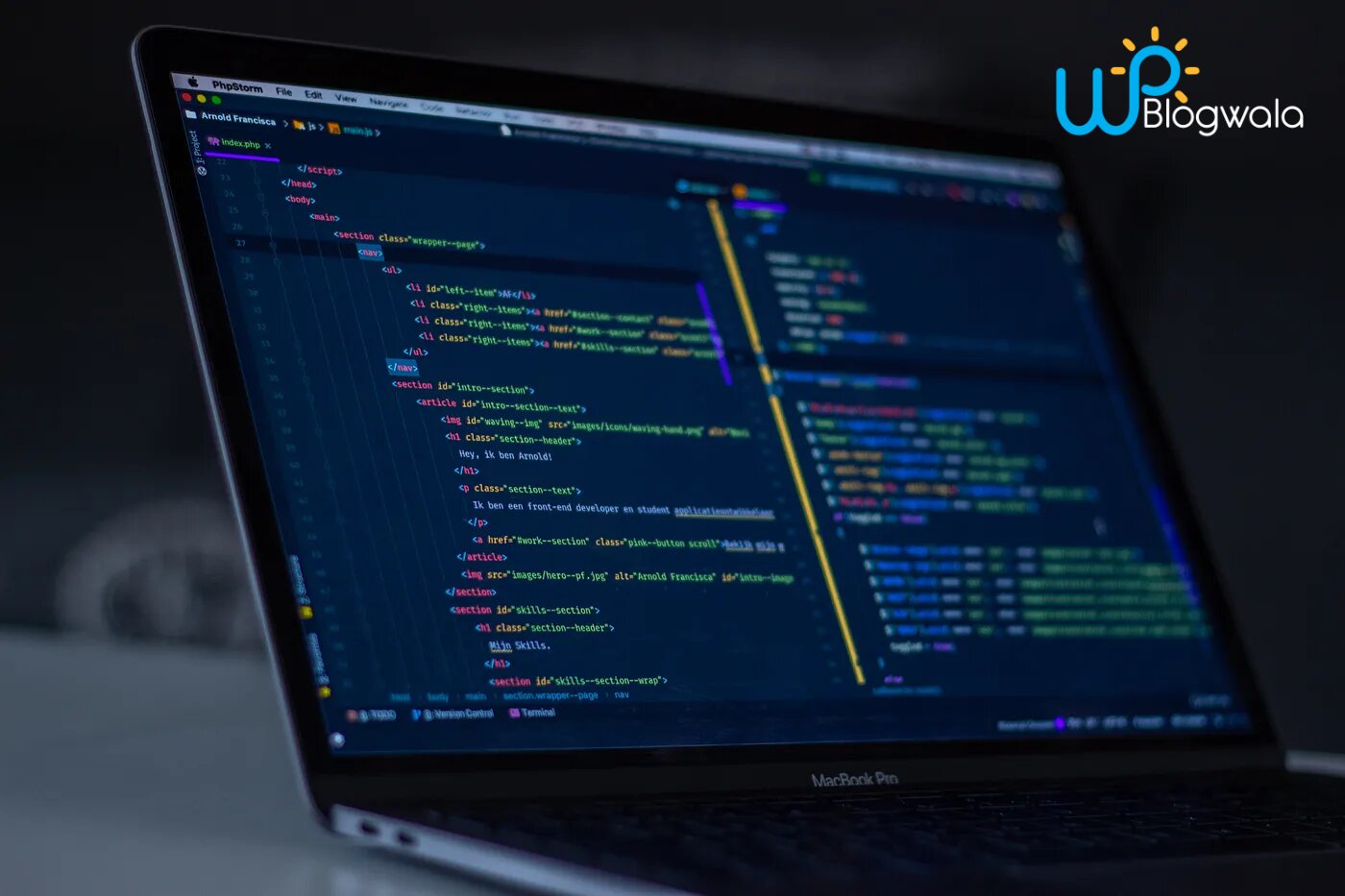What are PHP Development Trends In 2023
As of my last knowledge update in September 2021, I can provide you with some general trends that were anticipated for PHP development in 2023. However, please note that these trends might have evolved or changed since then. It’s recommended to consult more recent sources for the most up-to-date information. Here are some potential PHP development trends for 2023
Top PHP Applications Type & Technologies
While We all know about PHP due to WordPress and other Content Management Systems (CMS), PHP has also long been a “glue” language for web applications and APIs. Most Developers frequently interact with other web APIs, relational databases, key-value stores, message queues, and more in order to deliver business critical applications.
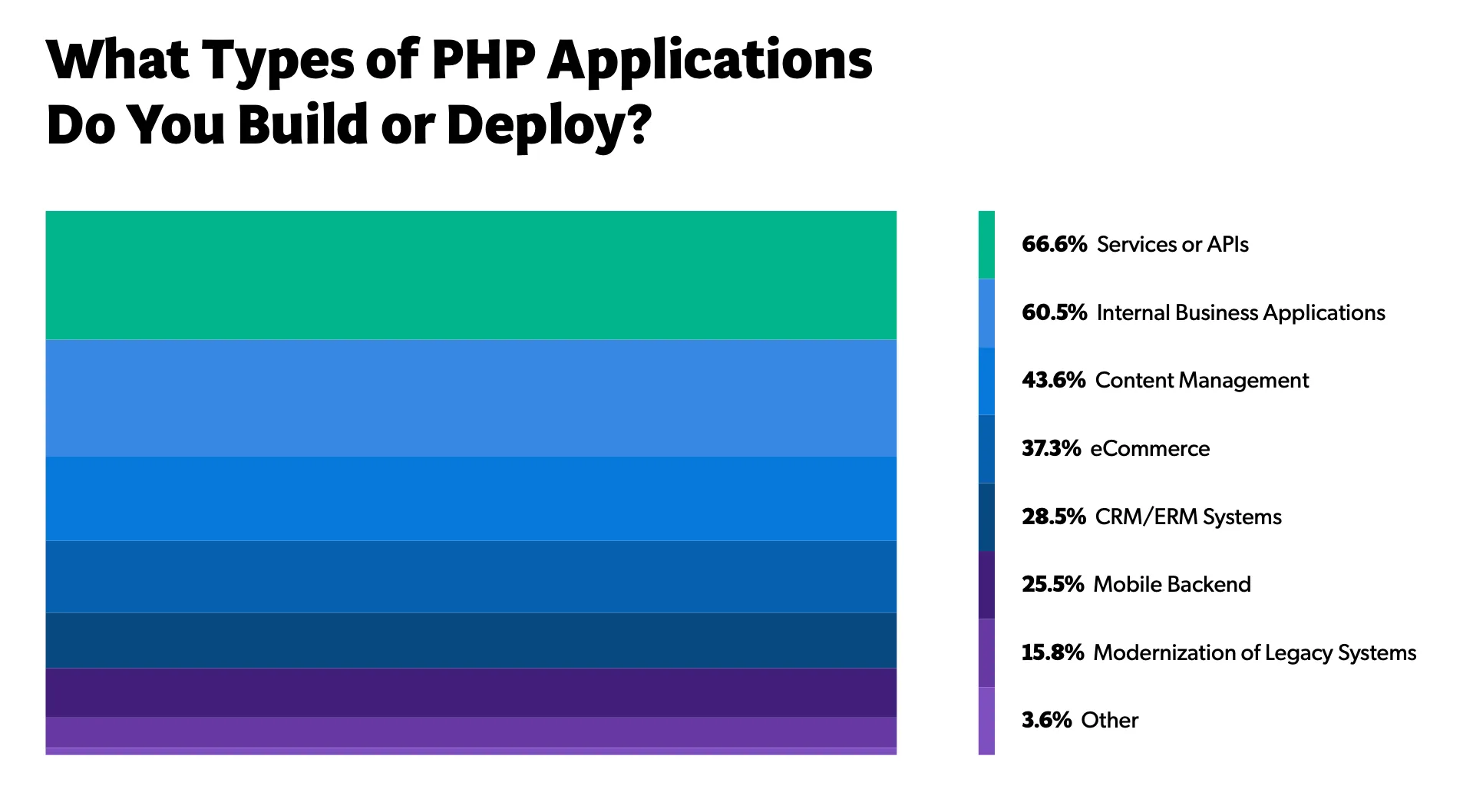
The top three categories were Services or API (66.6%), and Internal Business Applications (60.5%), then Content Management (43.6%).
Where Are The Teams Deploying Their PHP Applications?
The top three deployment options were AWS (46%), on-premises (36.8%), and Google Cloud Platform (19.5%). Among respondents who selected “Other”, VPS services were the most commonly provided response.
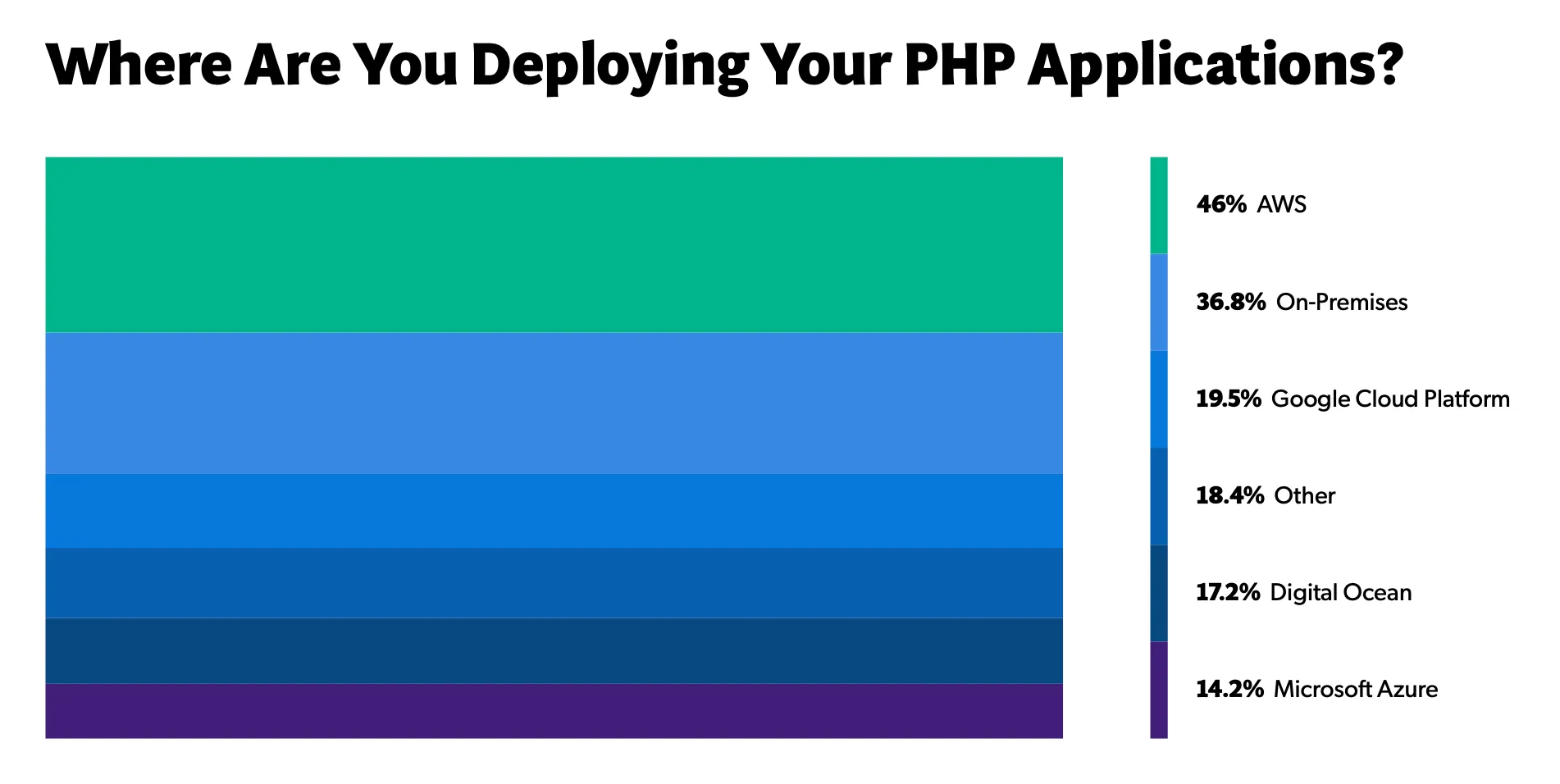
The results, when compared to 2022 results, showed a slight change in how teams are deploying their PHP applications, with AWS overtaking on-premises as the top option, and other cloud deployment options also showing growth. On-premises deployments dipped by over 10% year over year, while AWS and Google Cloud Platform gained 6% and 5%, respectively.
Top Web Servers For PHP Teams
The top three Web Server(s) usage were Apache (57.3%), and Nginx (56.5%) then Lighttpd (9.3%)
While Apache did maintain the #1 spot year over year, the percentage of users selecting Apache went down by nearly 20%. Lighttpd, LiteSpeed, and Caddy all experienced year over year increases, though they didn’t represent a significant percentage of overall responses.
Top Development Priorities For PHP Teams
In an ideal world, engineering teams would ship software free of bugs, and focus entirely on feature development that drives business success. No team is capable of this, however, which means engineering time is always split between maintenance and new functionality. Maintenance itself can take several forms: fixing reported issues, improving performance, addressing security concerns, updating dependencies, or even making the code easier to understand and maintain via refactoring. PHP developers have a wealth of tools available to them today, ranging from powerful integrated development environments to debuggers, profiling tools, and application monitoring.
Containerization & Orchestration
Containerized deployments are quickly becoming the norm for PHP applications. Since containers provide repeatable, idempotent deployment, they are a perfect solution particularly when an application requires autoscaling. Other benefits include the ability to develop applications in conditions closely mimicking production, the ability to model all infrastructure integrations, and the ability to lock down networking between services in ways that are difficult to accomplish in traditional hosted environments.
Over 57.5% of respondents currently using containerization technologies, with an additional 19.8% planning on using container technologies within the next year. Only 22.7% noted they were not using container technologies, and had no plans to do so within the next year.
Moving from containers to orchestration, the next report is about the adoption of orchestration technologies.
Over 47.7% of teams using orchestration technologies, with an additional 17.2% planning on using them within the next 12 months. Only 35.1% noted no plans to use orchestration technologies.
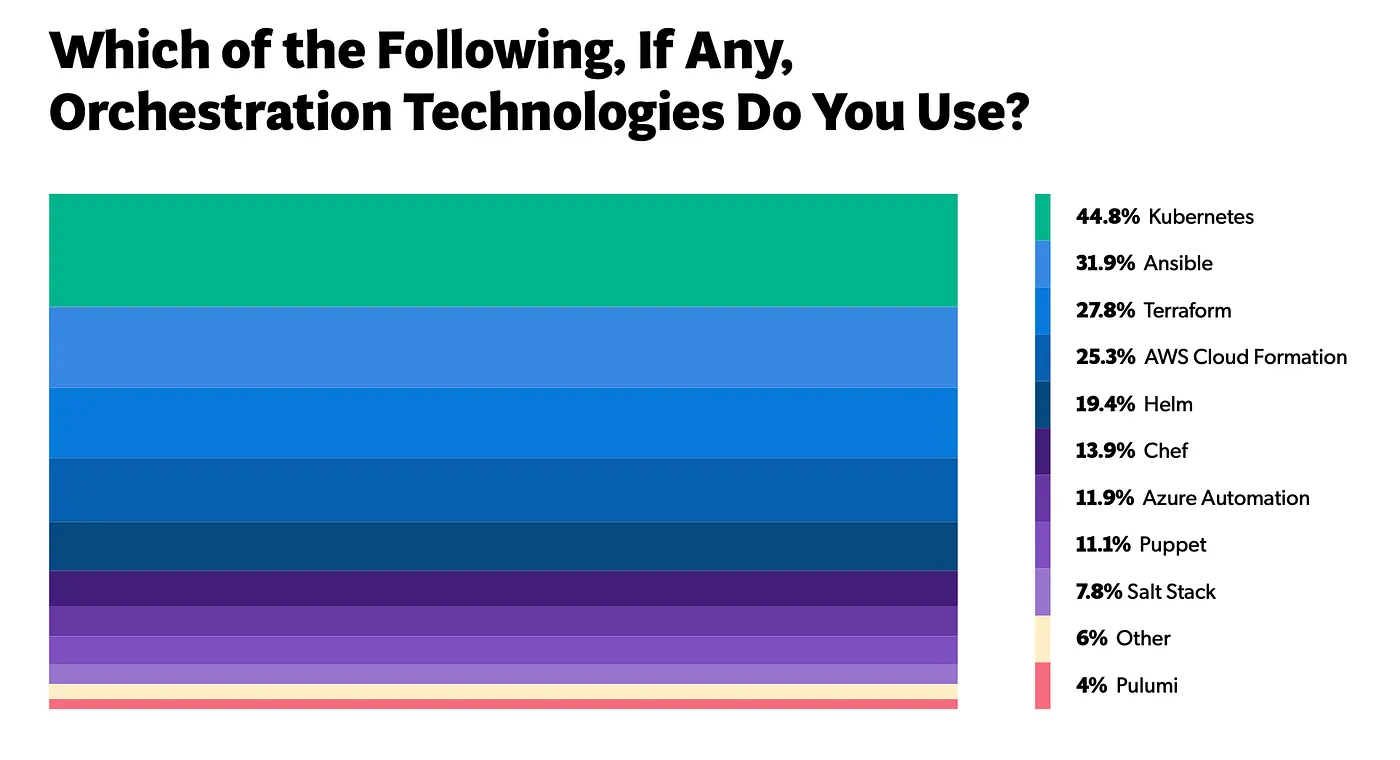
While popular cloud platforms such as AWS provide platform-specific orchestration technologies, consumers are clearly gravitating to open source solutions such as Kubernetes and Terraform, often combining them with other automation and provisioning tools such as Ansible and Puppet.
PHP Upgrade Challenges
While PHP strives to keep backwards compatibility between versions, we have observed that each version introduces subtle changes that have outsized impact on applications. Additionally, when deprecations are finally removed, they can lead to applications breaking in unexpected ways. As such, we are not surprised to see that refactoring and testing consume the bulk of time for respondents. Identifying what has changed, and how to adapt your code, while simultaneously ensuring all existing functionality works as expected are difficult tasks.
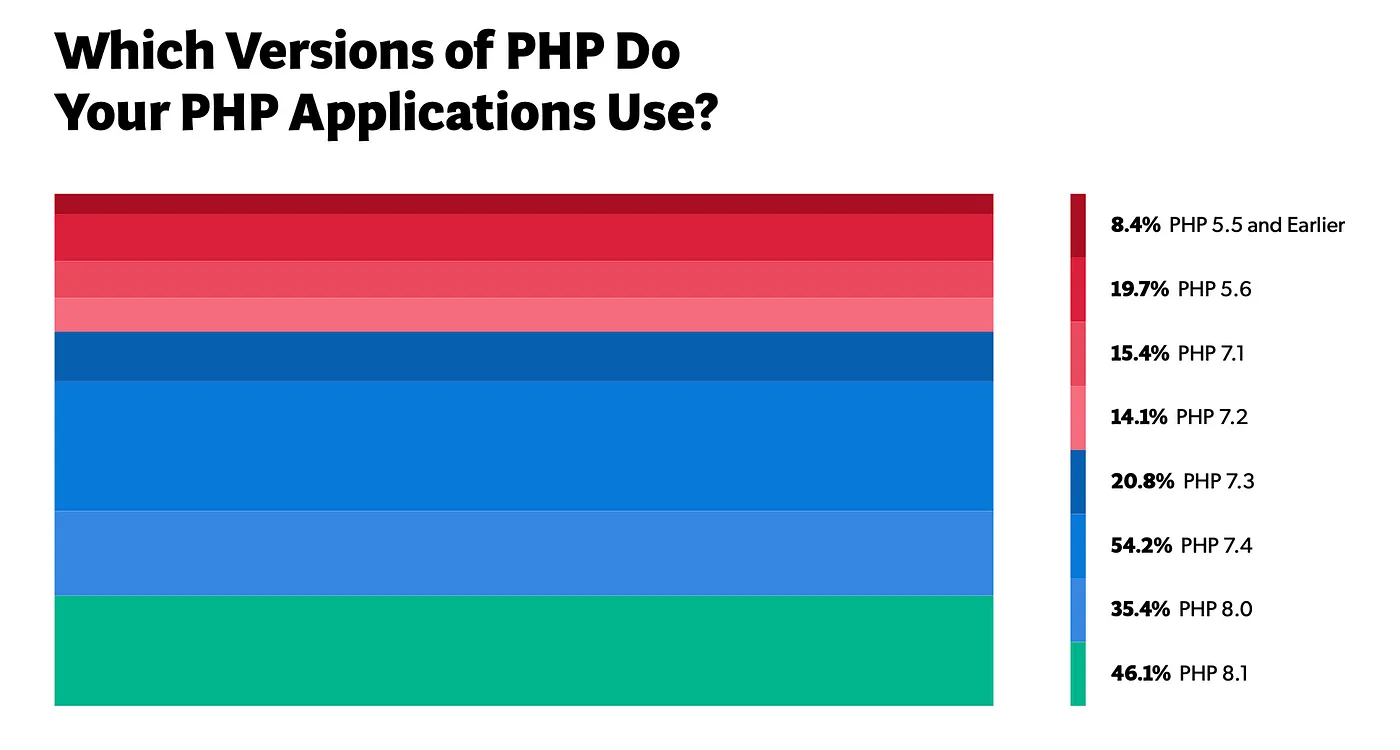
PHP Version & Upgrade Statistics
PHP versions follow a three-year lifecycle, with two years of active support, and an additional year of security-only support. This lifecycle allows the language to advance on a predictable lifecycle, but also leads to year-on-year churn for organizations using the language, as they need to constantly update infrastructure and test their applications against new versions.
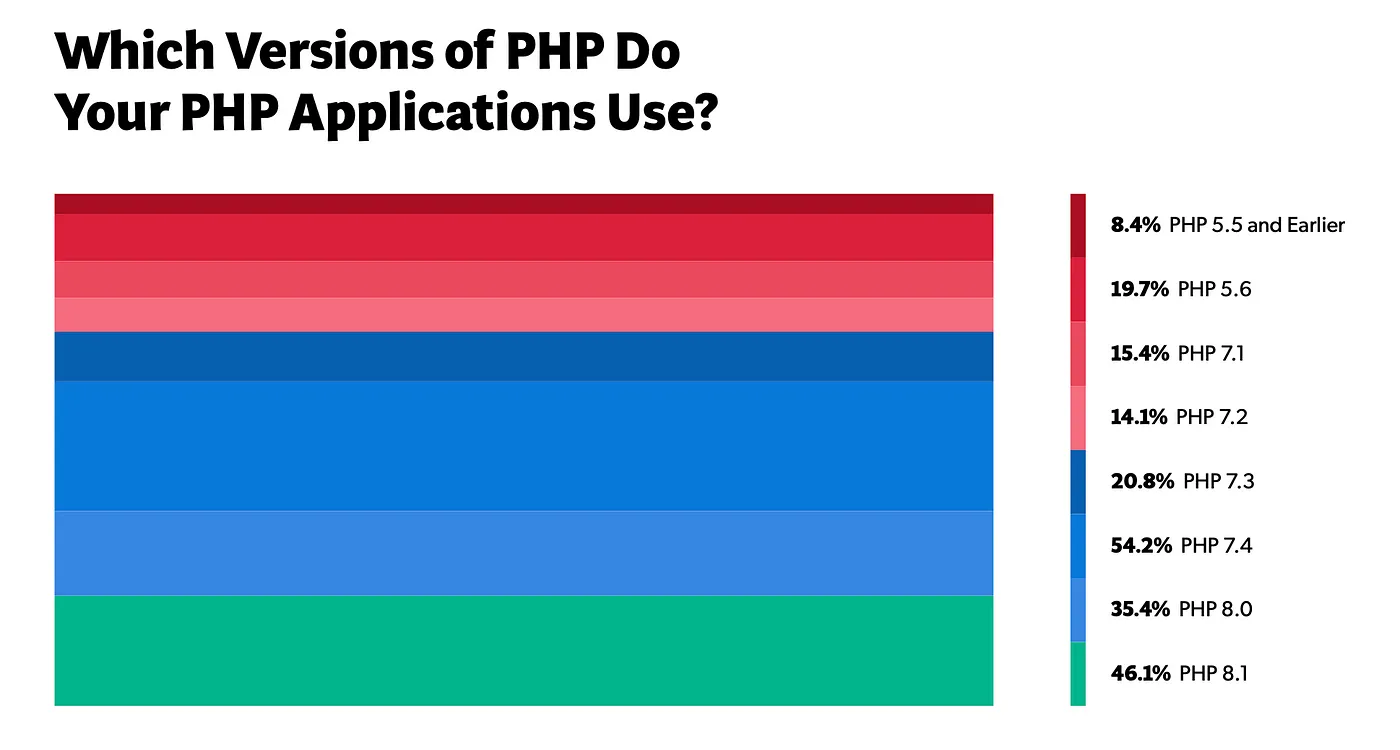
PHP 7.4 is end of life now. It received the most responses — with 54.2% reporting use of PHP 7.4 in their PHP applications. PHP 8.1 and PHP 8.0 were the next most popular, with 46.1% and 35.4% of responses, respectively. Compared to the 2022 survey, PHP 7.4 usage dropped from 66% to 54%, with PHP 8.0 usage also dropping (44% to 35%).
Overall, teams using end of life (EOL) PHP versions represented 61.9% of all responses
Top Challenges For PHP Teams
The survey found performance issues as the most common problem with 32.2% of responses, followed by debugging at 29.8%. Integrating with other systems came in third at 27.5%, with hiring and dependency management the next most common options at 24.4% and 24.1%, respectively
Final Thoughts
Compounding that this year is the fact that PHP 7 reached end of life with the end-of-life announcement of PHP 7.4 in November 2022. Organizations who have not yet adopted PHP 8 now find themselves needing to either migrate quickly, or find a commercial provider of a long-term-support edition of the language.
If your organization is using PHP, and you’re not yet using containers or orchestration techniques, it was very recommended to invest in these areas. While they pose challenges to learn and execute well, they will lead to more stable and repeatable deployments, providing insurance against rolling out bugs to production. It was also recommend taking time to research and invest in quality monitoring solutions to assist in identifying production issues, as well as their root causes. Combining these with infrastructure- as-code and a good continuous integration pipeline, you will also be arming your organization to adapt quickly to PHP updates.

